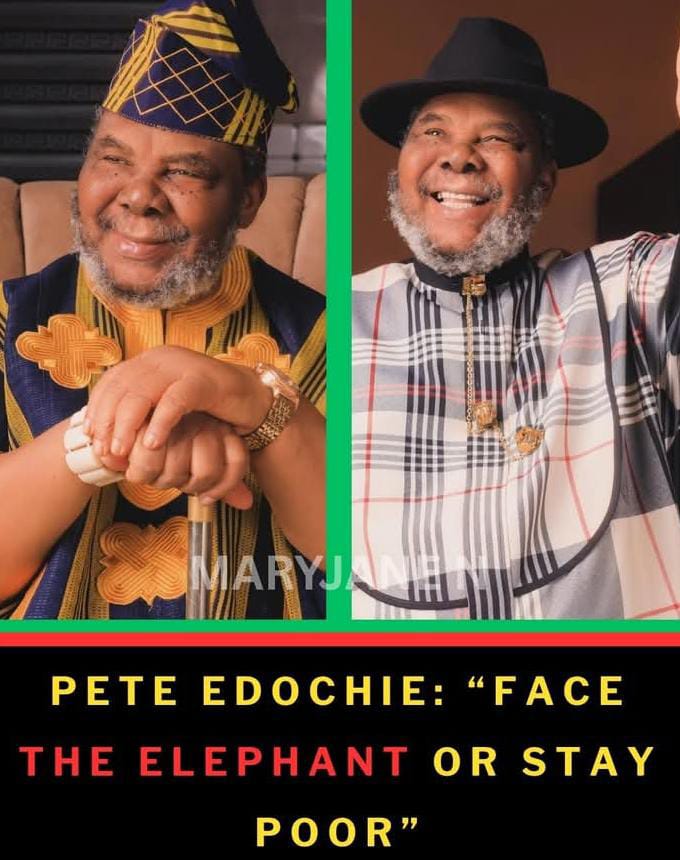When Pete Edochie speaks, the world listens—and this time, the veteran Nollywood legend has shaken the internet with a proverb so piercing, so raw, that it has set social media on fire.
Known for his thunderous baritone, iconic movie roles, and wise sayings that seem to carry the weight of an entire generation, Edochie has once again proven why he isn’t just a cultural icon but a philosopher of the people. His words always land like thunderclaps, and this one was no different:
“Let the young man in his desperation go out and hunt. If he kills the elephant, his poverty ends. If the elephant kills him, his poverty ends.”
With that single metaphor, Pete painted a chilling yet powerful picture of life itself—poverty, courage, and the dangerous choices desperation often demands.
The Elephant in the Room
The image is unforgettable. A young man, driven by hunger and desperation, must face an elephant—the ultimate symbol of life’s massive challenges. It is a battle where there is no middle ground: either he slays the giant and rises, or he is crushed beneath it, ending his suffering once and for all.
For some Nigerians, this is a call to courage: a reminder that success is never handed on a platter, and poverty only bows when one dares to fight back. For others, it is a sobering warning about the cost of risk—that in the gamble for survival, not everyone comes out alive.
A Mirror to Nigeria’s Youth
In a country where millions of graduates are jobless, where small businesses struggle, and where economic hardship has become a daily battle, Pete’s proverb hit like a lightning strike. Young Nigerians flooded Twitter and Instagram with reactions, many saying the words captured exactly what they feel—the hustle, the fear, the desperation.
One user tweeted: “Pete Edochie just summarized Nigeria in one line. You either fight your way out of poverty or die trying.” Another simply called him “the lion of wisdom.”
Memes, threads, and hashtags sprouted overnight. For some, the elephant was Nigeria itself—giant, immovable, and terrifying. For others, it was personal: unemployment, fear, self-doubt, or the never-ending grind.
Wisdom or Recklessness?
Of course, not everyone agreed. Critics argued that while the metaphor is powerful, it might encourage reckless decisions—after all, not every elephant should be fought head-on. Some warned that desperation can push people into dangerous or even illegal pursuits.
But defenders countered that Pete wasn’t speaking of crime; he was urging boldness. The elephant, they said, could represent building a business, pursuing education, or taking creative leaps into uncertain industries.
Why It Matters Now
What makes his words even more potent is timing. Nigerians are facing rising inflation, unstable systems, and shrinking opportunities. More than ever, the youth feel pressed against the wall, forced to either migrate, innovate, or collapse under pressure.
Pete Edochie’s proverb is not just a line—it’s a dare. A challenge. A reminder that poverty is not a passive state; it is a battle. And battles, by nature, demand courage.
The Legacy of a Living Sage
Decades after his Nollywood prime, Pete Edochie remains as relevant as ever. His proverbs ripple beyond entertainment—they cut into the heart of everyday struggle, carrying the voice of an elder who refuses to let silence reign.
And so, whether praised as wisdom or critiqued as recklessness, his elephant proverb has carved its place into the archives of unforgettable quotes.
Because at the end of it all, Pete’s chilling truth lingers: poverty ends only when you dare to face the elephant.







